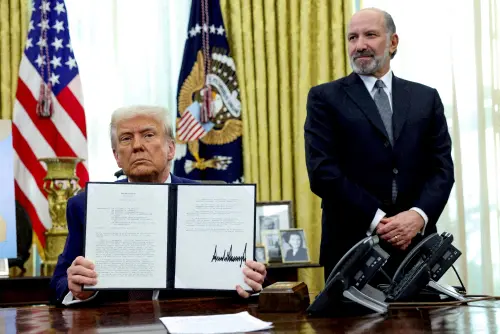A global trade war initiated by U.S. President Donald Trump has disrupted Wall Street's earlier optimism for a strong start to deal-making.
In the first quarter, mergers and acquisitions volume rose by 12.6% to $984.38 billion compared to the same period last year, according to Dealogic data. This increase was largely driven by the Asia Pacific region, where three significant state-run deals announced by China and a ports deal influenced by Trump nearly doubled M&A volume from the previous year.
Bankers around the world are scaling back on deals and generating less revenue. In the U.S., which accounts for nearly half of global M&A transactions, first-quarter volume dropped 13% to $436.56 billion. Although IPO activity saw an increase, market experts believe that a prolonged trade war could diminish its appeal in the future, as noted by Matt Witheiler of Wellington Private Investments, who expressed concerns about the potential drawbacks of going public despite favorable fundamentals.
New stock offerings rose approximately 4.1% to $160.22 billion, but many recent initial public offerings fell short of expectations and the total number of offerings decreased by 17.7% to 1,065, according to Dealogic data.
Cassander Verwey, JPMorgan's co-head of M&A for Europe, the Middle East, and Africa, pointed out that many deals announced in the first quarter were conceived last year during a period of heightened enthusiasm surrounding a new U.S. administration, which was expected to bring tax cuts and deregulation. With recent developments, however, this exuberance has waned, giving way to increased uncertainty.
Wall Street had initially anticipated regulatory relief, tax reductions, and supportive business policies under Trump. However, U.S. stock markets have sharply declined since his inauguration, making the initially expected outcomes seem increasingly unlikely, according to analysts and dealmakers.
Verwey emphasized that confidence is crucial for M&A markets, and noted that some deals were abandoned due to prevailing uncertainty. Bankers are wary that a slowdown lasting three years could persist, as global investment banking fees fell 4.9% to $21.47 billion compared to last year. The total number of deals has dropped by 25% to 7,629, marking a 20-year low. Analysts have begun to reduce first-quarter earnings forecasts for major banks involved in M&A advisory.
Jens Welter, head of North American investment banking coverage at Citi, remarked on the increased caution surrounding deals that carry significant tariff exposure, impacting both the launch and execution of transactions.
Some Wall Street banks are reconsidering their M&A activity outlook should improvements not materialize in the coming months. Nonetheless, there is still a glimmer of optimism.
Google's $32 billion acquisition of cloud security firm Wiz, the largest deal of the quarter, was facilitated by Trump, following its abandonment last year due to concerns over potential antitrust scrutiny under the Biden administration. Those involved in the deal are hopeful for improved approval odds under the current administration.
Ivan Farman, co-head of global M&A at Bank of America, noted the ongoing liquidity in the market and the desire to deploy capital, along with pent-up demand following slower M&A activity in previous years. He expressed increased optimism following recent activity.
A surge of megadeals in March, combined with robust IPO activity in the Asia Pacific, salvaged the quarter. Deal volume in Asia skyrocketed 92% to $264.46 billion, largely due to the state-run deals in China and CK Hutchison's $19.2 billion sale of ports to a BlackRock-led consortium. This deal, however, faced delays due to regulatory pressures from Beijing. The three acquisitions announced by China's Ministry of Finance also represented over $55 billion collectively.
In Europe, major deals contributed to a 7% increase in activity to $190.18 billion, including Banca Monte dei Paschi di Siena's $13.8 billion bid for Mediobanca. However, the total number of deals in Europe fell by 32% to 2,647.
The decline in deal activity resulted in Jefferies missing first-quarter earnings estimates, with equity underwriting revenue dropping 39%, raising concerns for larger rivals like Morgan Stanley, Goldman Sachs, and JPMorgan Chase as they prepare to report their results next month.
Brian Friedman, President of Jefferies, highlighted that the momentum experienced last year has been hindered by uncertainties stemming from government policies and geopolitical events. Since Trump's inauguration, the S&P 500 has declined more than 6%, and the tech-heavy Nasdaq 100 has fallen over 10%, dampening expectations for IPOs in 2025, particularly for companies that had previously delayed public offerings.
Keith Canton, JPMorgan's head of Americas equity capital markets, noted that both issuers and investors seek certainty to better gauge the impact on business models and to price equity accurately.
Venture Global, a liquefied natural gas exporter, and an artificial intelligence startup were significant contributors to IPO volumes this quarter, yet their market performances have been disappointing. Venture Global's shares plummeted nearly 60% since its IPO, resulting in a loss of approximately $33 billion in value. CoreWeave's debut also fell short of expectations, with shares trading more than 7% below the IPO price, raising concerns over sentiment towards AI infrastructure.
Robert Stowe, head of Americas equity capital markets at Barclays, pointed out that the combination of tariffs and economic uncertainty complicates management's ability to project business trajectories and performance in the crucial quarters following an IPO.
Some European firms have postponed their IPO plans due to market volatility. A German pharmaceutical company delayed its Frankfurt listing last week, while the German bank OLB opted to pursue a sale to French banking group Credit Mutuel Alliance Federale instead of going public.
Martin Thorneycroft, global co-head of equity capital markets at Morgan Stanley, acknowledged that although there have been significant deals throughout the past year, they remain infrequent, leaving many issuers looking for additional evidence of market strength before proceeding.
